Dogs are amazing animals, supporting many of us through all of life’s adventures. That’s even more true for the pups over at Medical Detection Dogs! Their Medical Alert Assistance Dogs are incredible, supporting people with life-threatening health conditions, helping to keep them out of hospital. Meanwhile, the charity is carrying out ground-breaking research with their Bio Detection Dogs, improving early diagnosis of cancer and other diseases. We’re proud to support such an incredible charity, providing insurance to the dogs over at Medical Detection Dogs!
At The Insurance Emporium, we’ve spoken to Chris Allen, Dog Supply and Socialising Training Manager at Medical Detection Dogs. He told us all about the organisation, the dogs, and the fantastic work they do over at Medical Detection Dogs!
Chris Allen
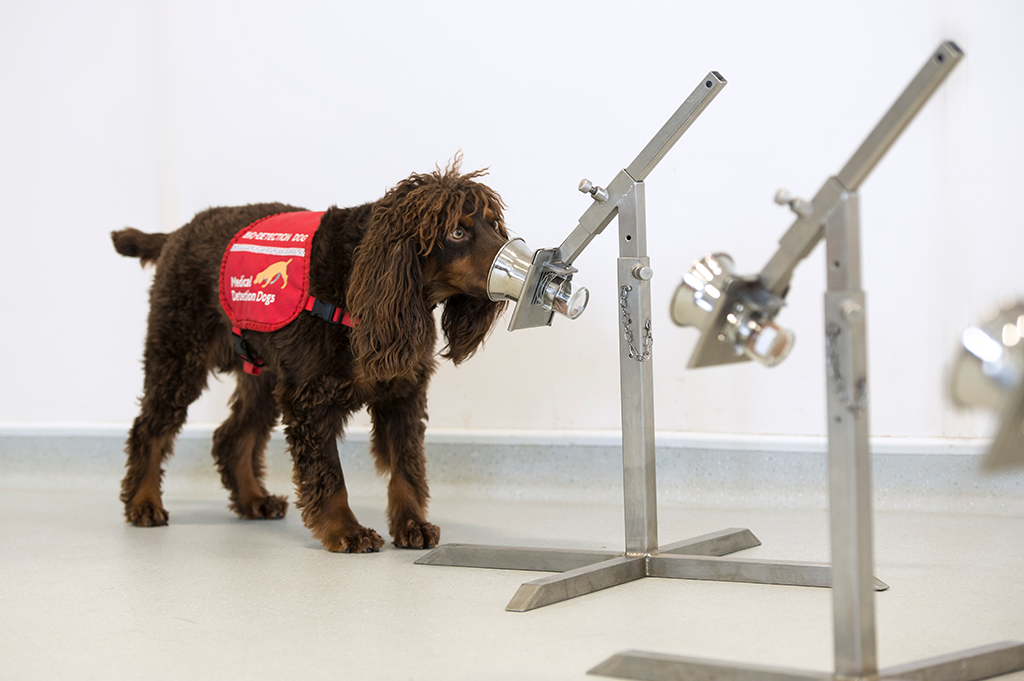
Chris’ career in the assistance dog world started 27 years ago. “Straight out of college, I was lucky enough to walk into a trainer role at another assistance dog organisation and learned my trade there as a trainer,” he told us.
From there, Chris carried out a number of training and management roles, before joining Medical Detection Dogs in 2018. “I’ve got many titles, but my main title is Dog Supply and Socialising Training Manager at Medical Detection Dogs.” This involves selecting each puppy that comes into the organisation, “whether they are going to be a Medical Alert Assistance Dog, a Bio Detection Dog or, more recently, maybe a COVID-19 Dog.
“Then, I manage the team of trainers who support the puppies from around 8 weeks of age to around 18 months, making sure they’re getting all the training that is needed by all the volunteers looking after the pups.”
Medical Alert Assistance Dogs
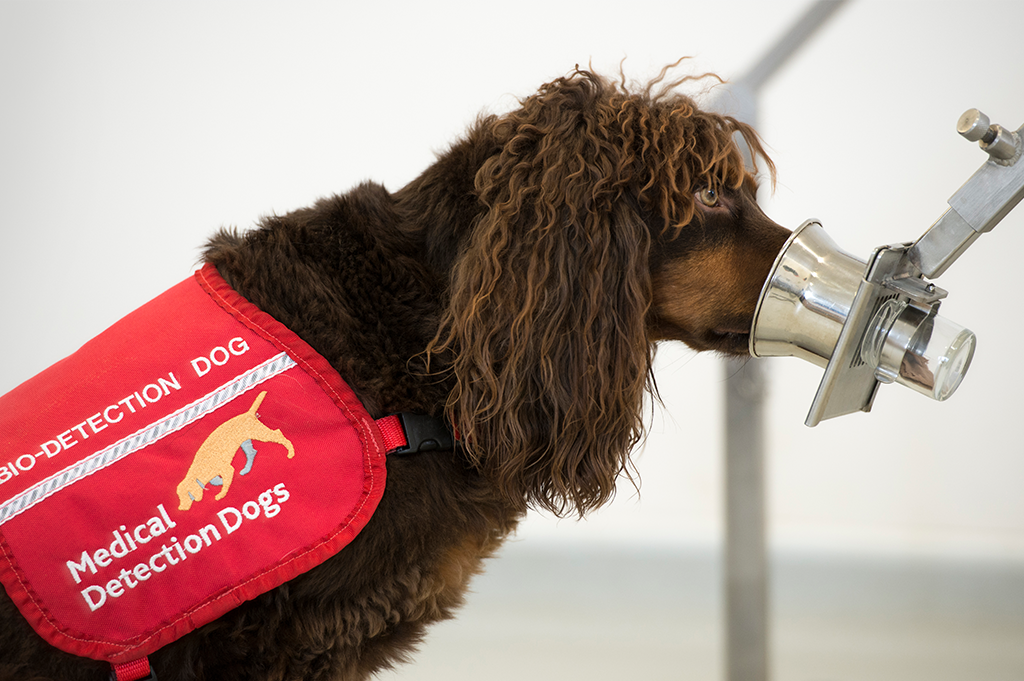
The Medical Alert Assistance Dogs are trained to detect a number of life-threatening conditions for their clients. “It’s all done, obviously, via odour,” Chris explained. “So, for example, Type-1 diabetes is one of the more common life-threatening conditions which we train our Medical Alert Assistance Dogs to respond to. We also have many clients with a condition called POTS, a cardiac condition which can cause somebody to suddenly collapse.”
The dogs are able to detect this through odour, then alert the client as to when they are going to have an episode. The dogs can also be useful for people with severe allergies. “We’ve got a dog who’s due to go out shortly that’s been trained to detect nuts within the area.” This particular client will be able to go out into public environments and be alerted when the dog detects the scent of nuts. They will then make the decision whether they want to remove themselves from that environment.
The Medical Alert Assistance Dogs are also invaluable to a family setting. “One of our clients is a family whose child has type-1 diabetes. The parents would constantly be up through the night, checking their bloods and just making sure they’re okay. Children are particularly vulnerable at this stage and could easily wake up in hospital.
Assistance Dogs for Families
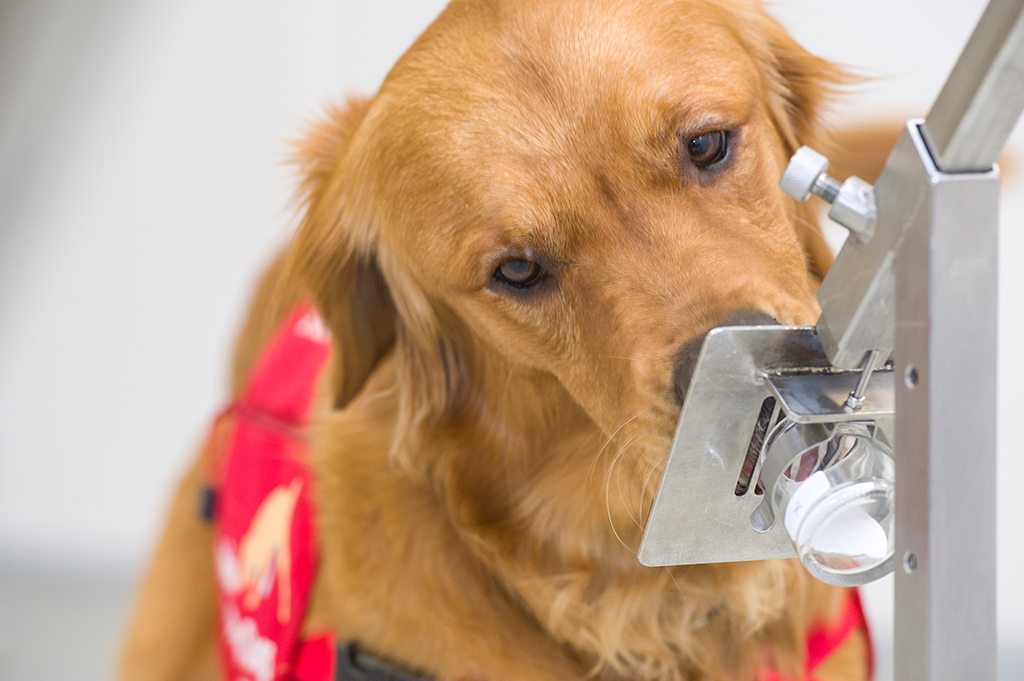
“The Medical Alert Assistance Dog would be in the room with the child, next to them throughout the night. If they detect an odour change they will wake the child up, then wake up the rest of the family. Again, way before the child or family would notice any signs, the dog is there, they’ve indicated the odour change and alerted the family. In many scenarios it really is a life-changing and a life-saving behaviour, and it’s all through that wonderful machine called their nose.”
And the dogs’ noses are amazing. “We’re just tapping into what they have learned and developed over thousands of years. I’m sure you’ve heard about the hounds and gundogs who use their noses to work. We are just tapping into that through our expertise and focusing them onto specific odours.”
It’s almost like you can’t beat nature! “You definitely can’t. Humans have 5 million receptors within our nose. Dogs have 300 million receptors. They’ve been bred for years to work alongside people as well. You not only have a dog that has a great nose and can detect you far sooner than other devices, but they’re also there as your companion, to give you confidence. They’re there to make you get out of bed, go for a walk, and lead a normal life.
How long does it take to train a Medical Detection Dog?
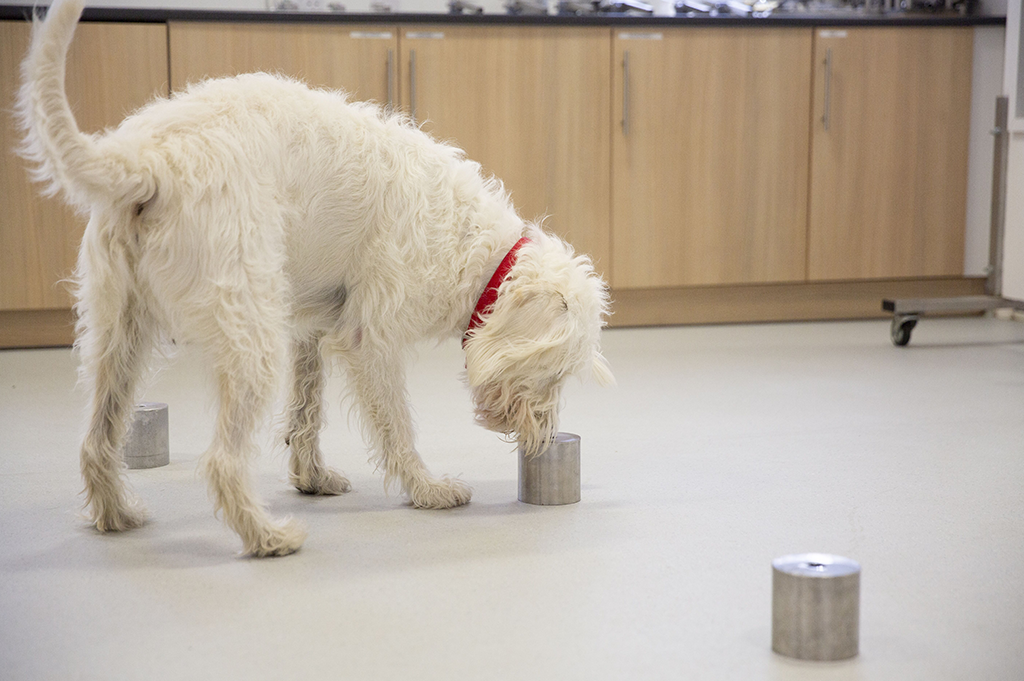
“A Medical Alert Assistance Dog can take up to about 18 months to two years or thereabouts,” said Chris. “Could be a little longer. The first 18 months of that puppy’s training is allowing the puppy to grow, to develop its character, to undergo general training, socialisation, get them used to everyday scenarios and out and about.”
It’s important for the dogs to see as much as possible while they’re puppies, so when they go out to work, they’re used to a range of environments and aren’t seeing things for the first time. “Getting them into shopping centres, public transport, on the train. By the time they go out working, they’ve been there, they’ve done it, they’ve got the t-shirt. They now need to work alongside the client and get used to their lifestyle.”
The dogs are generally placed with clients at between 18 months to 2 years old, but that’s not quite the end of their training! “You’ve then got the process of training them with the client, the dog getting used to their odour and adjusting to their lifestyle, so it can take another few months or so for the dog to settle in and get used to the client.”
The clients can then send through reports via an app, so the Medical Detection Dogs organisation can see how successfully each dog is working. “It’s a long process, but obviously worthwhile for every client.”
What makes a dog suitable for Medical Detection Dogs?
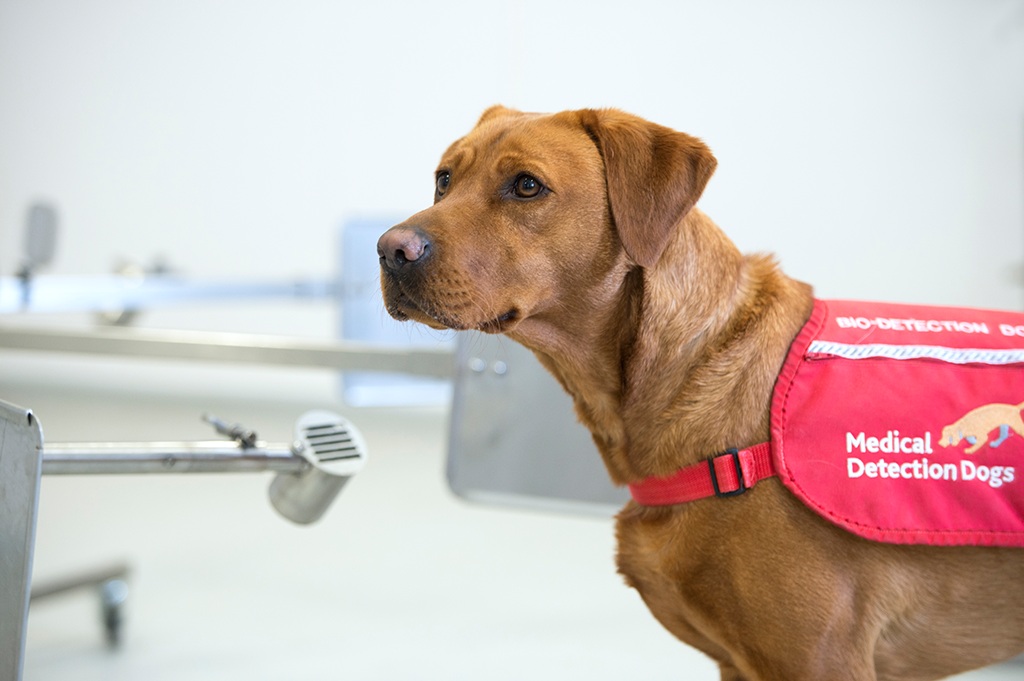
According to Chris, there are a few key factors they need from a Medical Alert Assistance Dog: they need to be sociable, have a high work drive and a good nose. “We say that all dogs have good noses, but it’s about how they use it at times,” said Chris. “It’s about sniffing a unique odour. But it’s also about controlling the nose at other times, so they’re not sniffing our crisp packets and rubbish on the floor.”
Persistence is key as well. “Say a client was asleep at 2 o’clock in the morning, and the dog does give an indication, that person may be heavily asleep. They’re not necessarily going to get a reaction straight away. The dog’s got to be quite persistent, quite wilful. ‘Come on, I’m going to get you to wake up, you must respond to me because it’s important.’
“We’re really looking for that X factor with our assistance dogs. We need different dogs with different characteristics within the charity to supply our clients and the bio detection team with what they need.”
Chris and the rest of the team at Medical Detection Dogs are doing great work! They’re also in the process of training their dogs to detect and sniff out COVID-19. We asked Chris all about the Super Six, the team of dogs being trained to detect COVID-19, here!
We’re proud to support such an incredible charity, providing insurance for their Bio Detection and Medical Alert Assistance Dogs. If a pup is part of your family, you might want to think about taking out insurance for your dog! The Insurance Emporium were awarded Pet Insurance Provider of the Year at the Moneyfacts Consumer Awards 2020, as well as Best Direct Pet Insurance Provider two years in a row at the Yourmoney.com Awards. You could even receive up to 30% discount* on your policy! Head on down to The Insurance Emporium to find out more.
* The 30% discount is made up of 20% Introductory Discount plus 10% Multi-pet Discount (if appropriate). The Introductory Discount is available for the first 12 premium payments on lunar and calendar monthly policies or one premium payment on annual policies.
All content provided on this blog is for informational purposes only. We make no representations as to the accuracy or completeness of any information on this site or found by following any link on this site. We will not be liable for any errors or omissions in this information nor for the availability of this information. We will not be liable for any loss, injury or damage arising from the display or use of this information. This policy is subject to change at any time.


